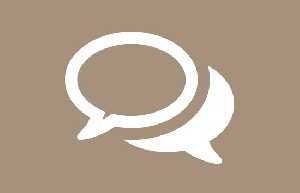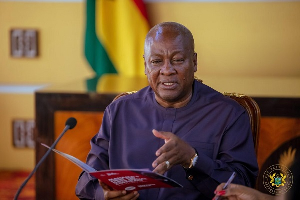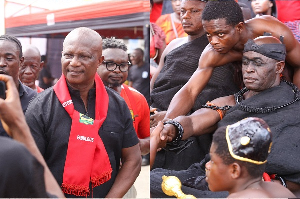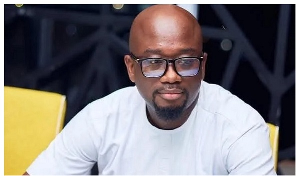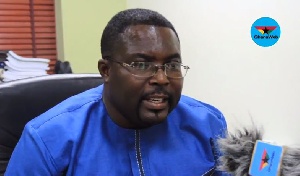The above headline is probably too ambitious but someone ought to say something. My starting point is that we can all do something about corruption, as the President says. Eric Hoffer, the American moral philosopher famously observed that, "It has often been said that power corrupts. But it is perhaps equally important to realize that weakness, too, corrupts. Power corrupts the few, while weakness corrupts the many..." To say the least, the weakness and silence of the many contribute to this unrelenting spate of corruption which is solidifying into a national way of life.
However, in truth, many Ghanaians are speaking up against corruption and the tide of feeling against the abuse of public trust is growing stronger by the day. Last Tuesday was a case in point. A group of civic-minded citizens who have come together to form the Citizens Movement against Corruption (CMaC), organised a march and at which three known anti-corruption personalities were recognised. These were Martin Amidu, Anas Aremeyaw Anas and Manasseh Azuri, three men who in their different ways are helping to uncover acts of official corruption.
According to the group's Coordinator, Kingsley Offei-Nkansah, "CMaC is an alliance between civil society organisations (CSOs) and the Private Sector with support from STAR Ghana, a multi-donor pooled organisation to address corruption and its concomitant negative impact on national development". Since its inception a few months ago, CMaC has been raising the anti-corruption temperature in the country. I attended one of its meetings and was impressed about the energy and commitment of the group. The fact that most of them are young (everyone looks rather young to me these days!) is a good sign of where we could be going.
But CMaC is not the only anti-corruption organisation in the country. A quick trawl online and other archives shows that over the years citizens have come together in hundreds of organisations in a bid to break the stranglehold of corruption on our nation. However, it appears that the more society fights back the harder the cancer of corruption tightens its grip. Corruption has always been with us but the scale of the cancer is now deadlier than ever before.
The prevalence of corruption on this scale despite the fighting effort of these gallant citizens exposes one fundamental but fatal ironic flaw: the majority of us do not seem to care enough to do anything about corruption. Perhaps, this is not fair; shall we say instead that the majority feel that they cannot do anything about the situation. This is where Mr. Hoffer's dictum comes in: weakness too corrupts.
All political parties say they are against corruption and since only political parties can and do form governments this means corruption should have been eliminated by now. The fact that corruption is not only with us but flourishing can only mean that the political parties are insincere when they say they are against corruption or they don't know what to do to eliminate corruption.
The second reason why corruption persists could be that as a people we have all bought into the basic philosophy from which corruption springs. Corruption starts with the idea of gaining unfair advantage over others. We appear not to have any trouble with that; indeed we are all seeking to take that kind of advantage.
Perhaps the greatest boon to corruption is that most of us do not know what can be done about it. That probably includes the government. I can hear a howl of protest as people read the last sentence. The government must know what to do because it has the power and the tools to tackle this job. The government, as we have all heard before, says that fighting corruption is a shared responsibility of all.
Let us give the government the benefit of the doubt; sometimes you may have the tools but not know how to use them, or the scale of the problem may loom so large that knowing how to start becomes too big a challenge. In the spirit of everyone doing their bit, I want to make the following suggestions: the first one goes to all political parties. As a minimum responsibility, every political party must give the nation a detailed plan about how it intends to fight corruption. They should not wait until the elections. Let them provide their plans now so that we can scrutinise them now rather than in the feverish atmosphere of the elections when cold logic gives way to emotions and hyperbole.
But it is only the government that has the capacity to truly defeat corruption. So, my main suggestions go to the government and the party in power. President Obama is famous for appointing "Czars" to oversee various initiatives. These are experienced men and women who are appointed to take charge of specific situations that require institutions and individuals to work together at the same time in order to resolve a problem or meet a challenge. So, for example, he has appointed an "Ebola Czar" to coordinate all the effort going into the Ebola project, so to speak.
The government must appoint a corruption czar to play this role in the fight against corruption. No single institution can fight corruption alone, and even if every institution that is mandated to fight corruption were to do their work perfectly, without a single point of coordination to ensure that they work in tandem, their efforts will bear little fruit. The most obvious person to fill this position would be Mr. Martin Amidu, who apart from the experience as a former Minister of Interior and former Attorney General also has the credentials of an anti-corruption crusader. The appointment of Mr. Amidu would signal to the nation and the whole world that the government means business in the fight against corruption.
The office of the Czar must be time bound so that it does not become an institution of state. However, it must have special powers that enable it to have access to any and all kinds of information it needs to do its work. The Czar must report periodically to Parliament and that report should be made public immediately through the media and all other avenues.
Secondly, we must invest in anti-corruption. You cannot fight against this massive cancer without the requisite medicine. I went to the police station at Akropong Akuapem the other day to report the theft of my Galaxy tab; I did not expect the police to find it but I needed to report it as required of a good citizen. The police would be the first port of call in the anti-corruption fight, but not in Akropong. I did not see even a typewriter and a computer would appear completely out of place in that office. I was given a handwritten report, and since there was no copy made, it means my report cannot be accessed in any way except by referring to the office notebook.
We must therefore invest in new equipment and technology; the perpetrators of corruption are probably years ahead of the institutions tasked to fight against corruption in resources, especially equipment and money. At the moment, we are fighting against jet fighters and drones with bows and arrows. Finally, we must carry out ant-corruption education at all levels of society and in the public media. If we really mean to defeat corruption we could do it and the resources saved will lift millions out of poverty.
Above all, the government must use its power to re-engineer society to think about our common priorities again. A society in which everyone believes in money as the only measure of all things cannot succeed. The general indiscipline is fertile grounds for corruption and evildoing. It is within the mandate and remit of the government to change all of this – if they have the political will.
This must be the measure of any government or political party seeking power. That it has a plan and people to fight against the greatest challenge of our time.
Kwasi Gyan-Apenteng Consultant in Communication, Culture and Media President, Ghana Association of Writers Member, National Media Commission
PAWA HOUSE Roman Ridge, Accra
Opinions of Wednesday, 29 October 2014
Columnist: Gyan-Apenteng, Kwasi





